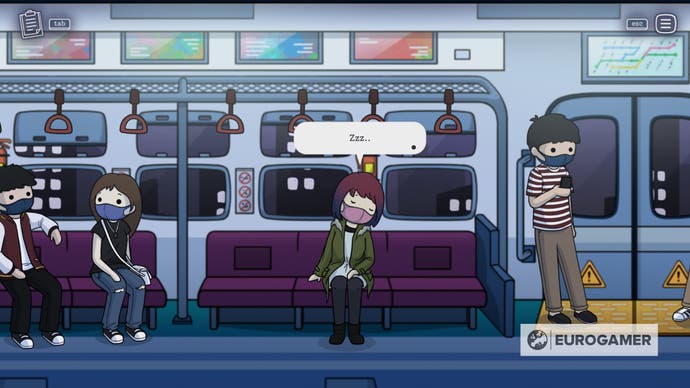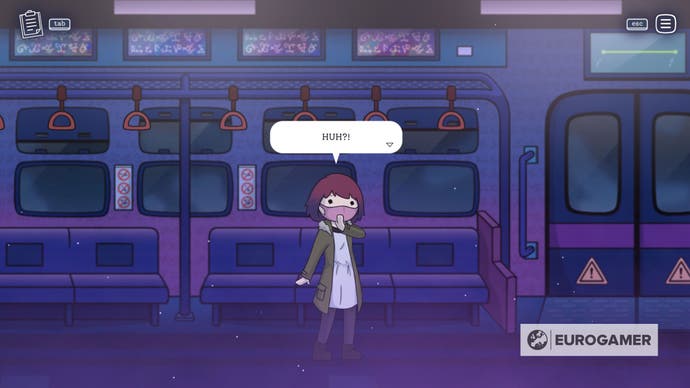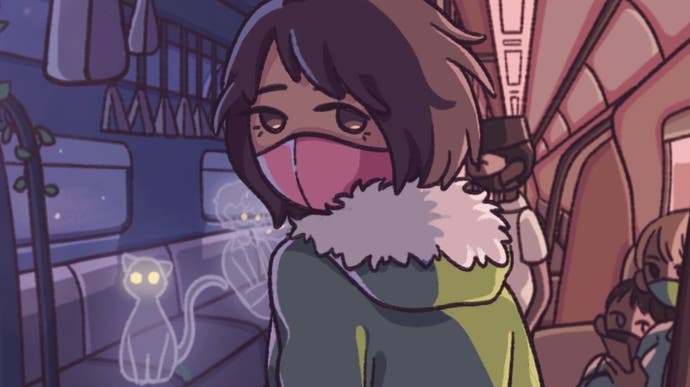What Comes After is a cuddle and a kind word when you need it most
Spirited away.
What Comes After is a game themed around death, with themes of suicide.
Bertie: I never realised how wise babies can be. When the baby on the train told me it's not that babies don't understand adults, it's the other way around, I felt as though I'd been hit in the face with a profound baby toy. I'd never really thought about it like that before. I always assumed they were the ones who needed teaching - but do they? They seem pretty happy and content with their lot. It's only in the many ways adults complicate things that life becomes more, well, complicated.
This is What Comes After; this is the way the game makes you think. It is a game about life, about reflecting on a life, and waving away all the complexity to enjoy simply being. It's the story of a young lady called Vivi who has lost her way a bit, and one night on the way home from work, on the train, she falls asleep. She literally drifts off, and she finds herself on a spirit version of the same train. A train taking spirits to... what comes after. What follows are many conversations with the once-living on their final journey, and the nuggets of wisdom they have to impart.
As you walk Vivi through the compartments, you rebuild a kind of appreciation for life. A kind of hope that things are, and will be, okay. It's not so much that passengers are guilt-tripping you into living a life they have now lost, more that they help you appreciate the insignificance, perhaps, of the things you were worrying about. Or perhaps the things you are worrying about, because it isn't just about Vivi: it's about you. It's about you hearing what many people, many things (for it's not just people), have to say about life. And there will be a few accounts which will ring particularly true for you, based on your life and experiences, and they will reach in and twang your emotional chords.
But this isn't a heavy game, it's light and uplifting. It's cute and colourful, and there's a surprising amount of comedy in the unexpected remarks people make about life's most serious occasion, death. Vivi has a plucky earnestness which is endearing. She's so sweet it feels almost embarrassing to hear her darkest thoughts. But I suppose that's the point: she's laying it bare, getting it out, and seeing that there's nothing to be ashamed of.
"What Comes After is a short experience, a heartwarming story, and a love letter to all of you who think you're a burden for other people," reads the game's description. And really, I can't say it better than that. What Comes After is, in its own gentle way, beautiful.


Chris: What Comes After completely up-turned my expectations. I completely agree with Bertie - there's nothing heavy or oppressive to this game about death and moving on. When Vivi falls asleep on a commuter train and wakes to find herself travelling amongst ghosts, I feared for what would follow. And yet what follows is a strange kind of delight.
It's absolutely transporting to move up and down the corridors of the train talking to all the different people. It's transporting, I think, because you're jumping straight into their worlds, into the crux of what they felt their lives were about. Or else you're just seeing a perfect snapshot of their character - I particularly liked the hard-done-by plants in one carriage.
So what do the dead talk about? They talk about all the stuff they should have talked about when they were alive. That's what comes back again and again - that these ghosts are left with a clearer understanding of things that confounded them when they were living.
Part of the team behind What Comes Next also made Coffee Talk. Two games that are delivered through conversations and which are also, I think, about the virtues of conversation. Talking things out. Admitting things that you've carried within yourself for too long. Opening the world up just by chatting about it. There is something very restorative about this kind of game. I'm delighted that this is a big part of what games are now.
If you feel like you need someone to talk to, the Samaritans are there to help. They can be called, for free, on 116 123 in the UK and Ireland, or emailed on jo@samaritans.org/ie. Lines are open 24 hours a day, 365 days a year.
In the US, the National Suicide Prevention Lifeline is 1-800-273-8255. In Australia, the crisis support service Lifeline is 13 11 14. Other international suicide helplines can be found at www.befrienders.org.


